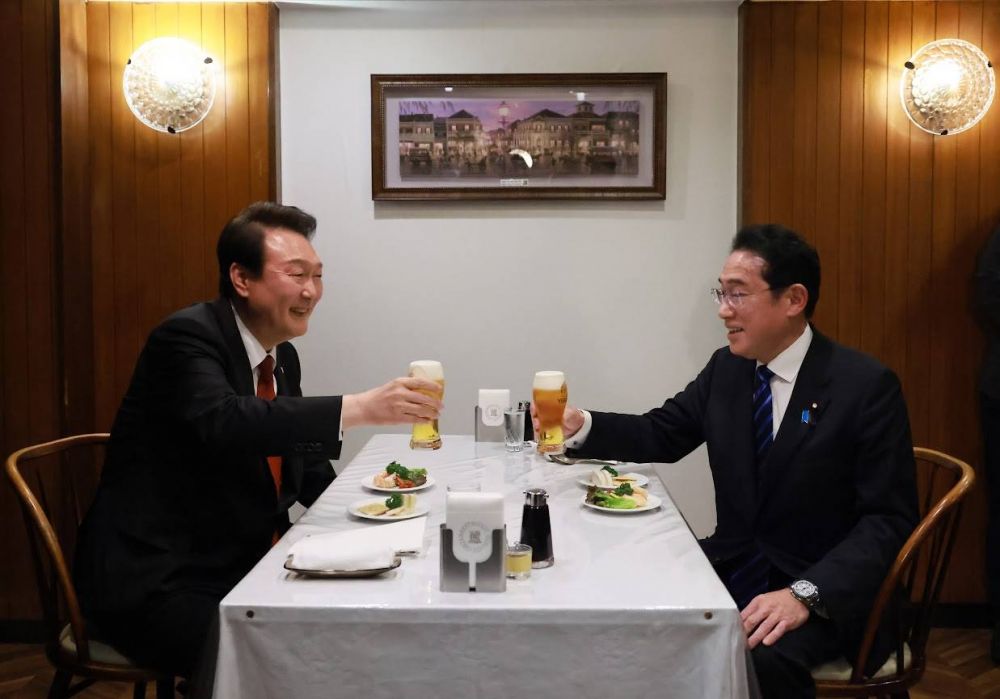Prompted by moves by the government of South Korean President Yoon Suk-yeol to address persistent irritants in his country’s relations with Japan, ties between Seoul and Tokyo have quickly warmed, leading to the first bilateral summit since 2011. Retired South Korean army lieutenant-general In-bum Chun assesses the political risks of Yoon’s initiative and the challenges and opportunities for both countries as they set a new direction in their relationship.
South Korean President Yoon and Japanese Prime Minister Kishida at a Tokyo restaurant, March 16: Relations have warmed quickly since Seoul moved to address persistent bilateral irritants (Credit: Prime Minister’s Office of Japan)
President Yoon Suk-yeol of the Republic of Korea and Japanese Prime Minister Kishida Fumio met for two days from March 16-17. The last time the heads of the neighboring nations for a bilateral summit was in 2011.
Since the ruling in 2018 by the South Korean Supreme Court that Japanese companies had to pay damages to forced laborers during the Japanese colonial occupation, relations between Tokyo and Seoul deteriorated. Japan reacted with restrictions on exports of semiconductor raw materials and excluding South Korea from its “white list” of preferred trading partners making trade between the two countries harder. South Korea in turn lodged a complaint against Japan at the World Trade Organization (WTO) and took Japan off its own white list. The real damage: the bitterness and ill will generated by these tit-for-tat actions.
Another critical fallout was the General Security of Military Information Agreement (GSOMIA) for intelligence sharing between South Korea and Japan. Although not totally nullified, the trust that is absolutely necessary for such a framework to work had been damaged.
The South Koreans were able to find a short-term workaround on the export restrictions but the real winner in the fight was North Korea, which benefited from the lack of strategic cooperation between Seoul and Tokyo. During the administration of Moon Jae-in, Yoon’s predecessor, who was in office until 2022, administration, rapprochement was mooted but with conditions that neither side could accept politically.
The Japanese welcomed this announcement and the United States applauded the Korean initiative. Japan invited Yoon to Tokyo from March 16-17, during which he and Kishida discussed the normalization of GSOMIA as well as the retraction of Japanese trade sanctions that would follow South Korea pausing its WTO case. Kishida invited Yoon to the G7 Summit the prime minister is hosting in Hiroshima in May.
For his part, Yoon attributed the decision to address the irritants in the Seoul-Tokyo bilateral relations to the geopolitical vortex polarizing the world: Russia’s invasion of Ukraine over a year ago, the continuing strains in US-China relations, and the ever-increasing nuclear threat from North Korea. All this requires that South Korea reconcile with Japan, he reckoned. This was, he explained, a difficult choice made for the future of the Korean people but one with which many voters might not be happy. Yoon was right: A survey found that 60 percent of those polled were against the decision, with 47 percent of that group absolutely against the deal. Among the 40 percent who answered that they supported the policy shift, only 22 percent said that they strongly supported it.
The immediate benefit of the warming of Korea-Japan ties will be better sharing of information, especially relating to North Korea. More exchange of strategic intelligence would help both countries prepare for and possibly country North Korean missiles launches. Pyongyang has been ramping up missile tests as the US and South Korean militaries engage in their largest joint exercises since 2017. On March 27, North Korea fired two short-range ballistic missiles into the waters off the east coast of the Korean Peninsula. The next day, the US aircraft carrier Nimitz and its accompanying strike group of vessels arrived in South Korea.
One way to support Yoon’s rapprochement efforts would be for Japan to step up cooperation on core technology and global supply chain issues that would benefit both countries. A stable supply of materials, spare parts and equipment will strengthen the ties and have significant economic benefits. With a closer relationship, Korea and Japan could collaborate on energy security and on taking joint action on tackling climate change. The opportunities for working together are limitless but still initiatives must materialize quickly to underscore the benefits of closer ties.
Between 1997 to 2021, Korea and Japan have cooperated on 121 projects in 46 countries that have resulted in a profit of 270 trillion won or roughly US$270 billion. The two countries complement each other with their sophisticated design skills and construction prowess. The two economies are likely to find more ways to work together in cutting-edge fields such as medicine, space, biotechnology and fintech.
But where they share the most common ground on which to build a fresh productive relationship is arguably in values – their shared commitment to the universal concepts of freedom, human rights and the rule of law. This aligns with the American geopolitical narrative that casts Russia and China as autocracies threatening the liberal rules-based international order. In the grand scheme of the Indo-Pacific, a more cooperative Seoul-Tokyo relationship would contribute to better security, greater prosperity and increased stability in the region and globally.
Yoon has taken a huge risk in setting Korean-Japanese relations on a new footing. Constitutionally limited to a single five-year term, which ends in 2027, if he is to maintain the cooperative stance towards Japan, he will need to demonstrate to his people as quickly as possible the concrete benefits of his strategy. The leaders in Tokyo and Washington should be sensitive to the political risks that Yoon has taken.
Further reading:
Check out here for more research and analysis from Asian perspectives.


